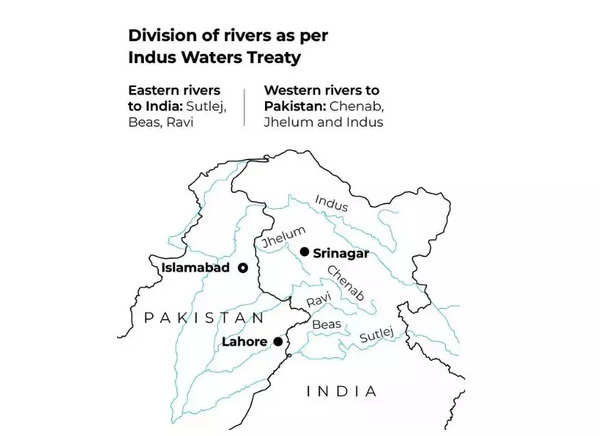
On January 25, India issued notice to Pakistan, demanding changes to the Indus Waters Treaty which was signed by India, Pakistan, and the World Bank in 1960. The treaty determines the allocation of rights to the waters of several rivers in the Indus Basin between the two countries.
While the treaty is perceived as a positive aspect of the otherwise strained relationship between India and Pakistan, dissatisfaction has been growing in both nations. This is not the first time that the two countries have publicly clashed over the treaty.
The crux of the issue is India’s desire to construct hydroelectric power projects on the Indus, Jhelum and Chenab rivers, while Pakistan, located downstream, can make unrestricted use of their waters. However, the treaty imposes limitations on India, which is located upstream, on how it can use these waters. Pakistan wants to be assured that India designs the proposed dams in a way that is aligned with its own evaluation of the provisions of the treaty.
Since the mid-2000s, India and Pakistan have been presenting opposing arguments regarding water usage. Since the BJP came to power in 2014, India has adopted a tougher stance on water-sharing with Pakistan. In 2019, Prime Minister Narendra Modi vowed to stop “every drop” of water from the Ravi, Sutlej and Beas—which are assigned to Indian use under the Indus Waters Treaty—from flowing into Pakistan.
On the other hand, Pakistan has utilized the dispute resolution mechanisms of the treaty thrice in the past. Initially, Pakistan requested the World Bank to appoint a neutral expert to address concerns that a proposed hydroelectric power project on the Chenab in India-administered Kashmir would provide Indian engineers with greater control over the river’s flow than permitted under the treaty. The neutral expert validated India’s plan in 2007, stating that it aligned with current best practices in sediment management.
Pakistan then requested the World Bank to establish an arbitral tribunal to examine India’s plans for a hydroelectric project on the Kishenganga-Neelum, a tributary of the Jhelum. The tribunal’s decision in 2013 did not fully support either country, leaving Indian officials dissatisfied as they await a definitive resolution.
India’s current discontent is primarily triggered by Pakistan’s objections to India’s Ratle dam project on the Chenab. Construction is set to begin shortly. In 2016, Pakistan requested the World Bank to establish another arbitral tribunal on this issue, while India preferred to refer the dispute to a neutral expert. To India’s annoyance, the World Bank launched both processes concurrently in 2017 and appointed key personnel in October 2022. In their demand for treaty modification, Indian officials have now threatened to disregard any interim decisions of the arbitration tribunal.
The latest demand by India to modify the Indus Waters Treaty differs from previous disputes between the two countries over the agreement. India has submitted its request to the Permanent Indus Commission (PIC), the bilateral organization in charge of implementing the treaty and resolving related issues. This indicates that the Indian government has intentions beyond mere rhetoric, as neither side has previously used the PIC to formally request changes to the treaty’s text.
However, it is as yet unclear what India hopes to achieve through such demand. Reports say that India has pointedly asked Pakistan to enter into new terms for resolution of disputes. Indian government representatives have blamed Pakistan’s “intransigence” for their actions. Nevertheless, if India expects Pakistan to accept new terms that favour India—while Pakistan is already fighting to prevent India from gaining advantages under the existing terms—what realistic incentive is there for Pakistan to engage in negotiations?
Indian leaders may hope that their advantage in upstream development and aggressive posture will intimidate Pakistan into compliance, or even provide justification for renouncing the treaty. However, either of these actions could prove to be serious miscalculations. Pakistan’s leaders are fully aware of India’s superiority in riparian geography and have long viewed the treaty as essential to national survival. If India unilaterally abrogates the treaty, Pakistan could interpret it as a deliberate effort to undermine the country.
Pakistani leaders may find it too costly to renegotiate with India due to the economic crisis and political constraints in that country. Thus, the chances of Pakistan agreeing to significant changes to the treaty are slim. Meanwhile, India is unlikely to unilaterally terminate the treaty as it hosts international events and the BJP would not want to risk embarrassing conflicts with its neighbour. Instead, India may express its dissatisfaction through the Permanent Indus Commission and the World Bank, highlighting its impatience with Pakistan’s objections and the Bank’s refusal to support India’s stance.
In 2018, Pakistan was grey-listed by the Financial Action Task Force (FATF) for inadequate action against terrorism financing. Although India’s external affairs minister claimed credit for keeping Pakistan on the list in 2021, the FATF removed Pakistan from the list in October 2020. India’s push for modification of the Indus Waters Treaty is seen as a way to keep up pressure on Pakistan, which India considers an ‘epicentre of terrorism’. The BJP stands to gain domestically from taking a tough stance on Pakistan, as it did in 2019 with Modi’s decision to authorize an airstrike in response to a terrorist attack in India-administered Kashmir before the national elections that saw the BJP storm back to power.
India’s desire for domestic political gains may outweigh its international reputation and it could potentially pursue upstream construction to undermine the Indus Waters Treaty. The government is reportedly opposed to third-party intervention in water management and may not seek World Bank assistance in resolving differences with Pakistan. (IPA Service)
The post By Seeking Change In Indus Waters Treaty, India Puts Pakistan Under Strain first appeared on IPA Newspack.


